#creed review
Photo

Boxing/sports stories are excellent models for learning story structure. We have a clear setup(of characters, relationships, conflict), progress, and payoff.
Creed III is a 2023 American sports drama film directed, produced by and starring Michael B. Jordan (in his directorial debut) from a screenplay by Keenan Coogler and Zach Baylin. It is the the third in the Creed film series, and the ninth overall in the Rocky film series. It also stars Tessa Thompson, Jonathan Majors, Wood Harris, Mila Davis-Kent, Florian Munteanu and Phylicia Rashad.
#creed iii#creed iii review#creed review#michael b jordan#tessa thompson#wood harris#mila davis-kent#florian munteanu#phylicia rashad#boxing#sports drama#movie review#2023
12 notes
·
View notes
Text
Creed III
Director: Michael B. Jordan
Cast: Michael B. Jordan, Jonathan Majors, Tessa Thompson
Release Date: March 3, 2023
My Rating: 7.5/10
My Review (NO SPOILERS)
Okay, so I still haven’t seen Creed I; take everything I say with a grain of salt. I did see Creed II, but I saw it opening night, four and half years ago, and haven’t ever watched it again.
Whenever a threequel comes around, I get worried that it won’t live up to its predecessors. That’s not an issue with this movie. Then again, I’ve not seen the original, so I’ve been judging these sequels solely on their own merits.
This movie had a lot of great fighting sequences, and packed a heavier emotional punch than I can remember Creed II delivering. The stakes didn’t feel quite as high, but they were certainly a lot more personal. The characters felt a bit underdeveloped and static, but I guess you could also maybe expect that with a third movie in a franchise, when the characters were already developed in the previous two movies.
The plot was coherent but felt a bit jumbled and rushed at some points. Right as the movie would started to dip into something deeper, it would change directions. It kept toeing the line of being something *more*, but it just never fully crossed that like.
Furthermore, even though I only saw it once, the final fight sequence of Creed II was so incredible. The sound mixing, the shots, the action? I was nearly standing up out of my seat cheering. I felt like I was there in the arena. The final fight in this movie…it got a little two symbolic for me. The imagery was over the top (Good guys in white, bad guys in black? Give me a break). Without spoiling too much, you’re really taken out of the boxing match atmosphere and it’s all focused on the boxers in almost a sort of dream sequence. It was interesting at the very beginning but then began to drag and went on a bit long. The fighting atmosphere only came back for the final round. The final fight just didn’t live up to the final match from Creed II in my opinion.
That being said, I really did have a great time watching this movie. It made me laugh, gasp, cry, smile, and hide behind my hands (I’m a bit squeamish, sue me). The acting was phenomenal, and the resolution was very fitting. It wrapped up the Creed trilogy nicely, and actually kinda of set up the possibility of a next generation Creed story. I found myself really hoping for that possibility.
If you liked the other Creed movies, this one is definitely worth seeing as well.
#movie review#creed#creed iii#adonis creed#creed iii review#creed review#michael b jordan#jonathan majors#tessa thompson#rocky movies#apollo creed#dame Anderson
2 notes
·
View notes
Text
Funny TBOSAS Letterboxd Reviews 6
These might be some of my favorite reviews yet.😭 Reblogs are appreciated.💞
Part 1 || Part 2 || Part 3 || Part 4 || Part 5 || X
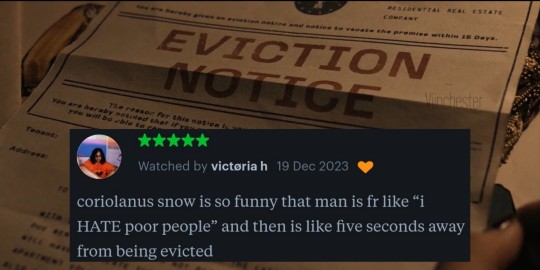
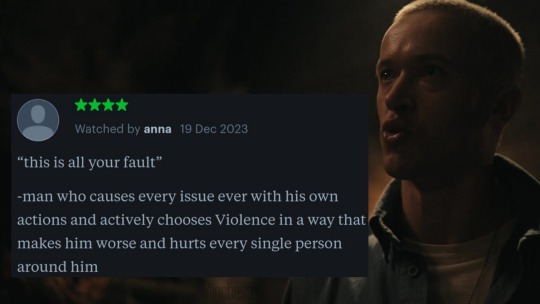


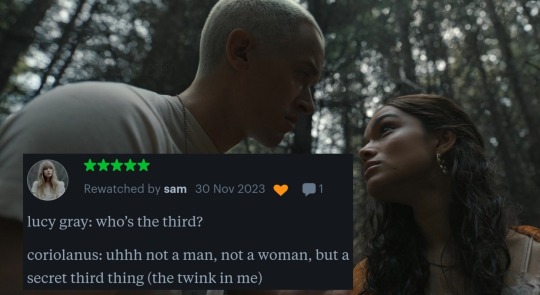
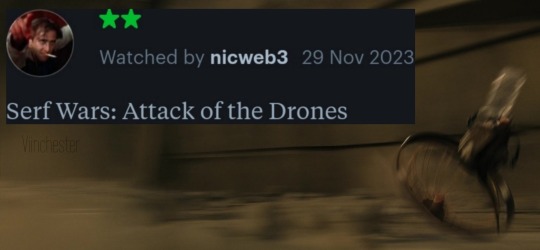
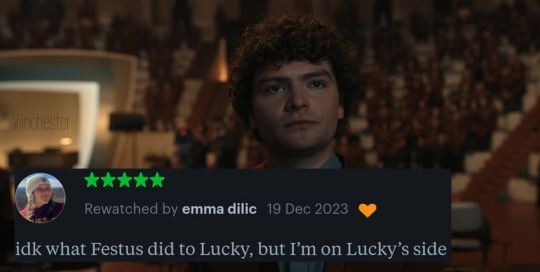

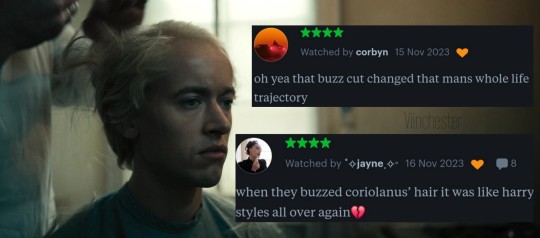
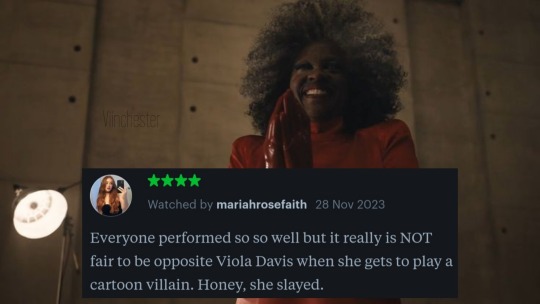
#The Ballad Of Songbirds And Snakes#TBOSAS#The Hunger Games#THG#The Hunger Games: The Ballad Of Songbirds And Snakes#THG:TBOSAS#Letterboxd Reviews#The Ballad Of Songbirds And Snakes Reviews#TBOSAS Reviews#Hunger Games#Coriolanus Snow#Lucy Gray Baird#Dr. Gaul#Volumnia Gaul#Dr. Volumnia Gaul#Lucky Flickerman#Festus Creed#Reaper Ash#Reaper#Festus#Lucy Gray#Tom Blyth#Rachel Zegler#Viola Davis#Jason Schwartzman#Harry Styles#Lucretius Flickerman#Katniss Everdeen#Katniss#Reviews
107 notes
·
View notes
Text
People in the comments of the Assassin's Creed: Shadows trailer becoming armchair historians trying to explain why Yasuke shouldn't be a protagonist actually are hilarious. Like besties this is a franchise where people can control eagles with their minds and a good 5% of the population are descended from evil psychic aliens. I THINK we can expand on a story of Japan's only-recorded African koshō without it jumping the shark.
#Assassin's Creed#Assassin's Creed Shadows#Actually losing my mind at gamer bros trying to logic a story that's LONG gone off the sanity rails#Like guys I get that Ubisoft 'prides itself' on historical accuracy but like#Ezio did not set Venice on fire Connor did not start the Boston Massacre and Shay didn't set off the 1755 Lisbon earthquake#Like we need to establish that this series follows historical details in some areas and then takes batshit crazy liberties in others#I hate giving credit to Ubisoft for their balls but.....yeah that took some nuts. Good job guys.#Absolutely wild that they're dropping preorders already. I will be eyeing this game's reviews but you're insane if you think I'm preorderin#Seta speaks
25 notes
·
View notes
Text
A Critique of ACV: The Last Chapter (SPOILERS!)
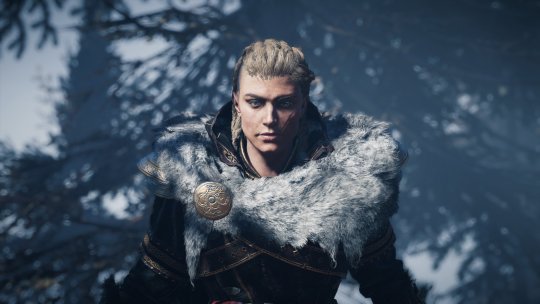
I wanted to hold off on sharing my thoughts about the new content until I’d given The Last Chapter time to breathe, because I was honestly hoping that maybe if I gave it some time, I wouldn’t dislike it so much. But the more I think about it, the more I find things to dislike about it. Which is why what started out as a quick write-up of my thoughts immediately after playing The Last Chapter has now spiraled into this very long critique that got so long I needed to add subheadings to break it up.
Sorryyyyy.
I’m basically spoiling everything from The Last Chapter here, along with Assassin’s Creed: Valhalla and parts of its expansions. I also briefly mention a few other Assassin’s Creed games, mainly Odyssey and one of its DLCs. My point being, if you don’t want to know anything then please look away now. Or don’t. But I know I would have appreciated a warning before diving into this mess. 💀
As a disclaimer: this essay is not meant to be an attack, nor is it meant to place blame squarely at the feet of Darby Mcdevitt, or any of the other writers or developers involved with the game. There are so many moving parts in a game as expansive and with as much add-on content as Valhalla, and I can only guess what happened behind the scenes that brought us to this point. I don’t know who wrote what, who made what creative decisions, and I therefore don’t feel comfortable placing blame on anyone in particular. I have never worked for Ubisoft and I can therefore only speculate about their internal culture based on what has been leaked from the company over the years. Furthermore, this is not an invitation to personally attack anyone involved in the development of this game on Twitter or wherever else. This is purely an attempt on my part to articulate why me and so many other fans of Valhalla and of Eivor feel so profoundly emotionally betrayed by this ending, as well as outline some factors that I believe contributed to the way the game was mishandled.
So. I think I had already accepted when the trailer released back in September that something like this was going to happen. I had already done my mourning for the fact that Eivor would never get the send-off she deserved, which is why I think I’m a lot less upset than I would have been otherwise… but that doesn't make this suck any less. The Last Chapter was completely underwhelming, it was emotionally unsatisfying, it completely butchered Eivor's character, it felt incomplete, and rushed, and it felt more like a teaser for Mirage than anything close to the conclusion Eivor’s story deserved.
The (Character) Assassination of Eivor Varinsdottir
When we first meet Eivor as an adult, she is overconfident, brash, and she has just gotten in over her head and gotten both herself and her crew captured by the enemy. She is in the 17th year of a quest for revenge she has been in pursuit of since she was nine years old. She has spent more than half of her life hunting Kjotve, the man who stole her parents, her clan, and her childhood from her, and is fully prepared to die if need be to kill him. She is an orphan who was taken in by the Raven Clan after the slaughter of her own people, and she considers these people to be her new family. Her love for her family and community are central to Eivor’s character right from the beginning. While she learns and grows past some of her flaws throughout the game, her love for her community and her loyalty to them is what sticks with her.
Eivor also starts the game carrying an immense amount of shame for how her father died, laying down his axe in the hope that the rest of his clan would be spared, only for he and most of his people to be slaughtered anyway. Through her time spent acting as a leader to the Raven Clan–first as a warrior and later as their Jarlskona–Eivor finally understands by the end of the game why Varin did what he did, because she realizes that she would make the exact same choice to protect her people. Eivor, too, would choose to die in “dishonor” if it offered even the smallest chance to save her loved ones.
Eivor is the reincarnation of Odin; she carries his memories and his thoughts, unbeknownst to her. She has visions and prophetic dreams and hears his voice in her head, but spends much of the game not understanding the meaning of it all. The part of her that is Odin pushes her toward chasing personal glory, toward the pursuit of knowledge, toward selfishness. But she chooses to abandon all that in favor of the people she loves, even as Odin rages and screams insults into her ear and calls her a coward–the one thing she has always been most fearful of becoming. Odin is a representation of everything she has been told to value in life, and she is (literally) pulled in the opposite direction by Sigurd, Randvi, Hytham, Valka, Gunnar, Soma… everything else.
youtube
Eivor never truly seems to grasp the meaning of her connection to Odin, Sigurd’s connection to Tyr, Basim’s connection to Loki, or anything about the sages or the Isu at all. Not in the base game or in any of the DLCs. She never really acknowledges it explicitly until The Last Chapter.
Put a pin in that.
Family and community are central to Eivor’s character. Loyalty is central to Eivor’s character. Honor is central to Eivor’s character. That’s why it makes absolutely no sense for Eivor to drop everything, seemingly out of nowhere, to go back to Vinland alone and live out the rest of her days learning from Odin, the part of her that she explicitly rejected at the end of the main game. And it certainly doesn’t justify Eivor deciding to leave Ravensthorpe in the middle of the night without a farewell, regardless of who she supposedly said goodbye to offscreen. It doesn’t justify her completely sudden and out of character decision to walk away from her clan, her family without a true goodbye. Eivor spends the entire base game acting as Jarl in Sigurd’s stead in everything but title, because Sigurd has all but completely abandoned the clan in order to chase his own ambitions, only for Eivor to supposedly do the very same thing? No. It’s completely incongruent with her character and actively contradicts facts that were established in the main game.
There are so many other inconsistencies, including the fact that I highly doubt Valka–the same Valka who we saw warn Eivor against digging too deeply in her visions in the intro to The Forgotten Saga–would simply accept Eivor departing for another continent to delve deeper into her visions. But the way they miswrote Eivor’s character was particularly glaring. There could have been a version of the last chapter in which Eivor's motivations actually made sense, but that version needed so much more evidence for it to be believable. Reading between the lines is one thing, but expecting players to accept the conclusions you’re feeding them without planting any seeds beforehand is just lazy writing. [insert “HE WOULDN’T FUCKING SAY THAT” meme]
The RPG structure is the root of all evil (I know just… hear me out on this)
I think applying an RPG structure to Assassin’s Creed was a mistake, and have thought so for a while, but not really for the reason you’re probably thinking of. The “but we’re reliving another person’s memories in the animus, so how can it possibly make sense to allow us to make choices that affect the narrative?” reason. My criticism of the addition of choices is mainly this: I think that by trying to “expand” the story by adding RPG elements and dialogue options, they instead ended up severely limiting themselves. Because the problem with adding dialogue options to Assassin’s Creed is they can never take those choices to their conclusion. They can never truly have consequences.
Trying to tell a linear story with a non-linear structure like this doesn’t work, or at the very least, it hasn’t worked in Assassin’s Creed thus far. Odyssey came closer, I think, because it had multiple distinct outcomes and player choices actually had an affect on the trajectory of the plot (Mostly. Hi, Legacy of the First Blade. I’m coming for you in a minute.). Odyssey's multiple endings present a different problem entirely in the context of Assassin’s Creed because despite the input of choice, there is still a canon version of the story and a canon ending. It leaves those players that arrived at a different outcome feeling alienated, and like their choices were incorrect or simply didn't matter.
But in Valhalla, all roads lead to more or less the same destination and most decisions have no impact on the trajectory of the story. The problem that arises from this is that players will make their choices and expect some sort of payoff, as they should. But they won’t really get it. As per Darby McDevitt, for example, Sigurd always goes back to Norway at some point, regardless of whether a player ends up with the “good” or the “bad” ending. Sigurd returning to Norway is a fixed point and the timeline will always course correct, so to speak, to reach that end.

(Thank you @/vikingnerd793 for the screenshot!)
Everyone gets more or less the same version of The Last Chapter, with the siblings’ interactions only varying slightly after the “bad” ending to reflect the fact that Eivor and Sigurd haven’t seen each other in a while. But even with the tiny variations in dialogue that exist, a few changed lines in a scene that doesn't last any longer than two minutes still fail to make Eivor and Sigurd's supposed off-screen reconciliation feel even remotely earned. Ubisoft wanted to offer “choice” while not following through with emotional payoff for those choices because they only wanted a single ending. Even if a player ends the main game with Sigurd deciding to stay in Norway as a result of Eivor’s “betrayal,” the consequences of that to their relationship are never truly explored.
Having only one ending with no variations in an RPG means that they couldn’t address any of the plot points that could have been affected by player choices. Interpersonal conflicts are watered down or only vaguely referenced. They couldn’t truly address the state of Eivor and Sigurd’s relationship because that would depend on what endgame the player reached. They couldn’t give Randvi an actual goodbye because some people didn’t romance her and therefore it might feel “forced” to those people, despite her being a major character. Vili–despite apparently being Eivor’s best friend–can’t appear because for some people, he’s busy being the Jarl of Snotinghamscire. There is no true emotional follow through for any of the choices made throughout the game. The end result is a goodbye tour consisting of Aelfred, Guthrum, and Harald, three people who Eivor has little to no emotional attachment to, but whose roles in the game are fixed no matter what choices the player makes, which means they’re safe to use. To be clear, Hytham’s role in the narrative is also fixed, but the reason I separate him from the other three is because he is actually emotionally significant to Eivor. His goodbye, unlike the other three, feels earned.
To be clear, I don’t place the blame entirely on the writers for this because, as I’ve said, they were given a franchise that revolves around linear stories, told to put dialogue options into it, and make sure all those choices still lead to the same conclusion. As an extension of that, they brought back people who worked on the base game two years after its release to tie up loose ends that should have been dealt with years ago. I wouldn't be surprised if those same creators have all since moved on from this story and its characters, both creatively and emotionally. It's been two years. Even longer than that since they actually worked on the game. I wouldn't fault them for not having the same enthusiasm they once did. But the end result is a last chapter that feels almost completely devoid of emotion, and ties up absolutely none of the loose ends that most people would expect from a permanent “goodbye.” It fails to reach the emotional highs and lows that a conclusion with two years of build up should have.
Which now brings me to Randvi.
Oh, Randvi, now and forever shackled to her map table.
I know this will be a hard pill to swallow for a lot of people, but I always suspected that they would never actually follow through on making Randvi and Eivor's relationship canon despite the fact that it is indisputably the most fleshed out romance in the game. They are hinted at right from the beginning, in the form of Randvi’s clear dissatisfaction with her marriage to Sigurd and in Eivor’s lingering gazes. It is the only romance option in the game that has any effect on one of Eivor’s core internal conflicts: remaining loyal to her brother. “The wind calls [her] back to Randvi” after almost every single regional arc, whether players choose to pursue a romance or not.
But Darby McDevitt Official Headcanon or no, I never thought Ubisoft would "force" another romance after the backlash from Odyssey's Legacy of the First Blade (I told you I’d come back to it). I truly believe the company will and has happily suffered criticism from the Queer community for forcing a relationship on gamers who played Kassandra as a lesbian. Kassandra who, prior to the DLC, also never shows any interest in starting a family, or becoming a mother, or “continuing the family line”, as would become Ubisoft’s flimsy correction to the storyline after the criticisms started rolling in. But I highly doubt they would be okay with alienating the bigots who seem to form the loudest portion of their player base. That would be too much of a risk to their bottom line.
To me, the romance plotline in Legacy of the First Blade was the inevitable result of Ubisoft wanting to tell a linear story with a non-linear structure. I think they did so without thinking through the implications of letting players choose their character's sexuality, only to then backtrack on it later because they needed Kassandra to have a baby. And what they seemed to take away from that was only that all forced romance is bad, without grasping the nuance of why that particular forced romance was so bad. This isn’t to say there should be any forced romance at all but that it should have served as a lesson of why one shouldn’t make a game with so much emphasis on player choice, only to take that choice away and even retroactively nullify those choices when it suits the needs of the plot. But that wasn't Ubisoft's takeaway. So in Valhalla, they pulled back. They made all player choices matter just a little bit less.
Eivor and Randvi’s relationship is inarguably handled with more care than any of the other romances in the game. It is inextricable from the narrative, whether it is a romantic relationship or a friendship. But despite any amount of blatantly obvious subtext that exists, Valhalla is still an RPG and the creators cannot confirm or deny any of the choices as correct or incorrect. And because they have to cater to all possible endings, they cannot address Eivor and Randvi’s relationship in any capacity because it might be misconstrued as being forced. Despite every overt piece of evidence that exists, Valhalla is still technically an RPG and at the end of the day, plenty of people did not choose Randvi. No amount of narrative director headcanons or heavy subtext will change the fact that Randvi is a seemingly meaningless choice in a sea of meaningless choices, and has now remained so permanently.
Ubisoft just really sucks as a company, actually
Everything that I am about to say in this section (and honestly, most of the next one as well) is conjecture because again, I don't know how certain creative decisions were reached behind the scenes. This isn't just about Randvi, or about Eivor's sexuality. It’s also about Ubisoft’s long and storied history of internal misconduct and suppression of marginalized voices. It's about Ubisoft's history of employee abuse in general. It's about the fact that Ubisoft suddenly decided to let players choose their gender, but only once they finally got around to making mainline titles starring women. Syndicate’s Jacob and Evie share the role of protagonist, and would have also shared equal screen time if Evie’s role hadn’t been significantly minimized throughout production in favour of her brother. Aya was originally meant to replace Bayek as the main playable character early on in Origins, but was later reduced to a side character who is only playable in a few missions throughout the game. Aya, the founder of the Hidden Ones. The order that would later evolve into the Assassins. The order that is the namesake of the entire franchise, just to be clear. Odyssey was originally conceived as Kassandra’s game, before the developers were made to allow players the choice to play as Alexios. Every female protagonist in the franchise thus far has been minimized in some way, and Eivor is unfortunately no different.
Assassin's Creed is a huge enough brand at this point that they could have easily released Odyssey with only Kassandra, and Valhalla with only Eivor. But instead of taking a "risk" and doing just that, they added the male options to cater to a small but vocal minority of misogynistic piss babies who don't want women to exist in their video games, period. At least, certainly not as fully realized characters with personalities and thoughts and feelings of their own. That would require acknowledging women as people, rather than as identical playthings that mostly exist as a social stealth mechanic for them to hide behind when they need a cover.
It’s especially funny because it was such a futile effort. That very same group of people was never not going to complain about Assassin’s Creed going ��woke” for having female protagonists, even if they were optional. Those people were going to complain no matter what, and they absolutely have as evidenced by the fact that they've been having a conniption on Twitter for the past few months now that Eivor is suddenly getting even half of the attention from the marketing team that Havi has gotten for two years. The comments section on every official social media post featuring Eivor is a sea of people complaining about how “female” Eivor being canon makes no sense, how her voice sucks, how she is just the result of Ubisoft pandering to a “woke” demographic. The “fan” response could not be more blatantly misogynistic. What’s more, Ubisoft bases the trajectory of their games at least partially on fan responses. It’s a toxic feedback loop of them making creative decisions built on sexism and the fans responding in turn.
Ubisoft deciding to implement gender choice as a mechanic didn't happen because they suddenly had a change of heart after happily ignoring their female players for years. It happened because they got busted for the "women don't sell" comments and the company's history of burying sexual assault allegations, and because they finally caught on to the fact that catering to gamers that aren't cishet men might actually be profitable. And it wasn't for lack of trying from the devs within the company because again, Origins was originally conceived as being Aya's game, Evie and Jacob were at the very least supposed to have equal screen time when development on Syndicate was in the early stages, Elise's role in Unity was also reduced... you get the idea.
Letting people choose to play as a woman or letting people choose to play as a Queer person is great. But it's an obvious cop out when your company also has a history of suppressing those very same voices, has done next to nothing to remedy the toxic company culture that encourages that behaviour in the first place, and when you've been dragging your feet as a developer about making your games even just a bit more inclusive for years. It’s an empty gesture when those female characters need to be watered down just enough for their male counterparts to make some amount of sense in the story, and when the marketing for the game hides them away like some kind of shameful secret.
Suddenly making games starring female protagonists because you’ve realized that it might be profitable, while also making it optional anyway, isn’t exactly the win for representation they seem to think it is. Especially when the marketing favours the non-canon, male protagonists so totally that most people would assume Eivor and Kassandra are skins of their male counterparts. Because heaven forbid the poor baby boys have their escapist fantasy shaken if they have to play as a woman who’s better at getting girls than they are. Making your representation optional makes your representation look half-assed and while I absolutely adore Eivor and Kassandra, I mourn what they could have been if their stories were allowed to be fully theirs.
Perhaps I’m being overly harsh and Ubisoft simply decided to implement gender choice in Valhalla in good faith. I honestly wouldn’t care if I thought it had, or if AC games had always allowed players to choose their gender. But considering the company’s history, and considering the game’s marketing, I somehow doubt that. Especially when, in their first game featuring a canon male protagonist since before AC pivoted to RPGs, they are not giving players the option to choose their gender.
Hi Basim.
Now don’t get me wrong. I obviously understand why Mirage doesn’t allow players to choose their gender; Basim is a pre-existing character, and it really wouldn’t make sense. But it is so transparent that they are willing to jump through narrative hoops to explain why Alexios is playable as the Eagle Bearer, but the same thing can’t be done for Basim. I suppose the importance of coming up with convoluted reasons as to why your protagonist’s gender is so easily changeable fades away when you’re not trying to replace a woman.
But what’s this? By God it’s–it’s Mirage with a steel chair!
The final content update for Valhalla feels like a teaser for Mirage. Full stop. If you think I'm being too harsh or unfair, then that's your prerogative. But in The Last Chapter, in the long-awaited conclusion to Eivor’s story, we don't even get to play as Eivor. The entire questline (if it can even be considered that much) consists almost entirely of cutscenes, which we view through Basim's perspective while Eivor is relegated to a side character. It’s a collection of Eivor’s memories that are supposedly filtered by emotional intensity, as Basim puts it. Grief, longing, sadness: all emotions that I fail to see being presented in the memories they gave us, at least for the most part. For the first time in Valhalla, we are voyeurs to Eivor’s memories rather than experiencing her life through her own eyes. The role of the animus user in past Assassin’s Creed games has always been pretty unobtrusive, but The Last Chapter constantly reminds us that Basim is there and watching. "Animus magic," as Basim calls it, was less of a necessity to the plot and felt a lot more like Ubisoft's marketing department gone awry.
I'm thinking about what Basim says at the end of the base game, when he is in the modern day and speaking to Eivor's remains. When he says, "I can take from you anything I want... your memories, your skills, your secrets. They're all mine." It's so ironic because he really stole Eivor's ending right out from under her, and I would have to laugh if it didn’t suck so much. It's all I could think about while I was watching Basim flippantly scrub through some of Eivor's most "emotional" memories which for some reason include… saying goodbye to Guthrum, a character we spend very little time with in the grand scheme of things, and who Eivor has next to no emotional attachment to. I understand the desire to tie up loose ends in terms of the historical events that were happening around this time, and they absolutely should have done all that because Assassin’s Creed has always been, in part, an exploration of history. But it should not have happened at the cost of providing closure for characters who were such significant figures in Eivor’s life.
I thought the Roshan quest was fun and I loved her and Eivor’s dynamic, even if we only got a small glimpse of it. But it was development time that could have been spent on wrapping up Eivor’s narrative instead of making another timeline agnostic add-on stealth mission in a game that has always had notoriously janky stealth mechanics. I look forward to seeing more of Roshan in Mirage and can now rest easy knowing that she is going to survive to the end of that game (although I cannot fathom why they decided to spoil that so early on). But they used what was apparently very limited time to give us a quest, very clearly a nod to Mirage, that does more to promote their next AAA title than serve the narrative of Valhalla.
Using the ending of a game to lead into the next is fine and is to be expected. But that transition should not come at the cost of a resolution for the story you're leaving behind. And really, it seems there was far more thought put into Basim and William Miles' first meeting than how Eivor came to the decision to leave for Vinland.
I think Basim is an incredibly rich, complex character, and it will be interesting to see what direction they take his prequel. But as someone who has actually been really excited for Mirage, the way they've dealt with this transition between games has left me feeling so conflicted, not least of all because of how quickly Ubisoft dropped the ball on Valhalla as soon as Mirage was announced. I’m not sure I’ll be able to look at everything we will be gaining with Basim in the next game without also feeling bitter about everything we lost with Eivor. It’s not terribly surprising, since Ubisoft has never treated Eivor’s character with any amount of respect; not in the marketing, and not in most of the post-launch content that has come out in the past year.
The post-launch that launched absolutely nothing
Darby has now said that The Last Chapter is meant as more of a direct follow up to the epilogue of the main campaign, to be played right after Gunnar's wedding. This is why they didn't feel the need to show a goodbye between Eivor and her people; the wedding functions as a sufficient goodbye to the Raven Clan.
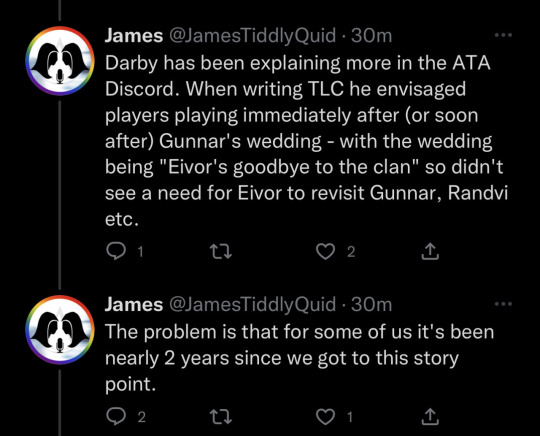
But even if that was even remotely satisfying, it doesn't explain when Eivor came to accept her role as a sage, a role that she has yet to understand by the end of the base game, even if she is perhaps beginning to question it at the very least. It doesn't explain why it was never truly addressed in any of the some 100 plus hours of content that have been released for this game since then. It doesn't explain why Eivor and Randvi might finally pursue a relationship, only for Eivor to suddenly pick up and leave for Vinland, alone and permanently. It doesn’t explain why Eivor would leave for distant shores without saying goodbye to Ljufvina, or Vili, or Stowe and Erke, or Broder, or Oswald and Valdis, or Swanburrow, or any of the many other people whose relationships Eivor cherishes throughout the game.
If anything, The Last Chapter being played immediately after Gunnar's wedding and the rest of the Hamtunscire epilogue makes it even more important for Eivor to say goodbye to her people, because that whole arc only cements Eivor’s devotion to her people, as well as how much her “encounters” with Odin have shaken her faith. Even then, that doesn't even touch on when or why she came to the decision to leave in the first place.
Due to a “play anytime” approach that Ubisoft–for reasons I cannot even begin to fathom–decided to take with all the post-launch content for this game, all DLCs for Valhalla are exactly that: they can be played at any time. They go to great pains to avoid spoiling story points from the base game, they rarely make references to events from the base game and, perhaps most critically here, they don’t build on any of the plotlines of the base game.
Remember that pin we stuck in Odin earlier? Hi. He's back.
None of the DLCs released in post-launch–from Wrath of the Druids to The Siege of Paris, to smaller, free additions such as the River Raids–touch on Eivor’s connection to Odin or her understanding of it, or any of the other potential threads left behind by the base game. Other more mythologically inclined entries like the Mastery Challenges, Dawn of Ragnarok, and The Forgotten Saga scratch the surface of it, but never dig deep enough for Eivor to put two and two together. Even in the Odyssey crossover with Kassandra, who has intimate knowledge of the Isu and their artifacts, Eivor remains completely clueless about her role as a sage despite it being the perfect opportunity for her to learn more.
At no point is Eivor shown to make any wild revelations about her Isu heritage that could justify her decision to leave. There is a gaping hole in the narrative where that development should be, and therefore the jump from “everything else” to “I’m older now, and I want to learn from the god who lives in my head,” is unearned and comes from completely out of nowhere. The DLCs could have remedied this easily by giving us deeper insight into how Eivor interprets her visions, specifically how she interprets her relationship to Odin. They could have dug into how and when she comes to terms with that connection, and the same could be said for how she comes to know about all the other sages, including Harald, who Eivor and Sigurd suddenly seem to know about being the reincarnation of Freyr despite not seeing him in more than a decade and never mentioning it before. But they can’t, because the DLCs are playable at any time, and therefore cannot discuss things the player may not yet understand.
The brevity of this DLC was especially jarring, even as someone who went into this with low expectations. Because after two years worth of updates, including some sizable free ones, I thought that surely Eivor’s conclusion would be considered important enough to receive the time and attention it deserved. After all, Kassandra got her own surprise ending in the form of the Crossover Stories, announced completely out of nowhere two years after the last DLC for Odyssey was released. After all the time and effort and love that clearly went into that crossover, it seemed reasonable enough that the ending for Valhalla, a game that was still being supported, would have the same amount of effort put into it, if not more. Instead we got a barely there wrap-up that lasts maybe 45 minutes at most, if you’re being generous, and fails spectacularly at offering the catharsis that should be a no-brainer in a story where the main character’s death has been a mystery to be unraveled, right from the beginning.
Eivor is dead. She has been dead for centuries, buried across an ocean from everyone and everything she knew in life. The how and why of Eivor’s burial site is a question that follows us through her entire journey and throughout the entire game. One that was never resolved… until now, with some vague notion about leaving everything she has worked for and everyone she holds dear behind in an attempt to find herself, all with the help of an entity with whom her relationship has been tenuous at best. Eivor decides to banish the part of her that is Odin because she doesn’t like that part of herself. That second soul, the part of her that values personal glory above all else. Even in The Last Chapter, she describes Odin’s memories as “malicious.” So why backtrack so completely?
I have no idea.
It’s possible the developers weren’t given enough time to give this final chapter the breathing room it needed to make sense. It’s possible they had lost enthusiasm, and just wanted to rip the band-aid off and get this thing over with. It’s possible Ubisoft wanted to cobble together the scraps of a potentially satisfying ending so they could say they did it, before turning all of their attention to their next title. As it stands, I wish they had just left Valhalla alone, with an open ending, instead of providing a non-answer that feels like an afterthought. An incomplete conclusion to a story and a cast of characters that many of us still care so much about, but Ubisoft seemingly gave up on long ago.
Eivor deserved better.
The Raven Clan deserved better.
Valhalla deserved better.
We, the fans, deserved better.
If you actually read this far then there is a good chance that you also need therapy
This whole affair really reminds me of the last time I felt this profoundly disappointed by a piece of media I loved. It reminds me of how I felt after watching the second season finale of The Mandalorian, when it hit me that the whole season had just been a series of various cameos and fan service moments that only made sense to the plot at a stretch. It hit me that I had just spent the previous eight weeks watching the show runners completely sideline their main characters–Din Djarin and Grogu–and lose the plot in favour of promoting future Star Wars projects. When it seemed like all the good writing in the show previously had been entirely accidental. But the major difference between The Mandalorian and the ending of Valhalla is that I knew there would be another season of The Mandalorian to potentially patch things up and pick up on some of the plot threads that were dropped. For Valhalla, this is it. There is no more content upcoming that will patch this up and, in hindsight, there are plenty of other things added to this game in post launch that I think would have also made me feel the same way I feel right now if I knew they were the last piece of content we’d ever see.
Am I overthinking this? Perhaps. Am I being melodramatic? Probably. But to me, this ending for Eivor feels like yet another perfect example of what happens when corporate interests are allowed to dictate creative decisions.
I say all this as someone who has and will continue to defend a lot of Valhalla’s faults, because if writing this whole thing has done anything, it has served to remind me how good the core narrative of the base game really is. It has depth, it has heart, and I hope that other people who enjoyed it as much as I did–and are as disappointed by The Last Chapter as I am–are able to reconcile the beauty of Eivor’s character arc in the main game with the way it was seemingly undone in The Last Chapter.
I’m trying my very best to not let this ending retroactively take away all the joy I’ve found in this game for the past year. And in spite of how negative this critique has been, writing it has actually really helped me do just that. Because in writing this critique, I was also looking back on Valhalla’s narrative, its highs and lows, its major plot points, and I was re-watching clips. A speed run of Eivor’s greatest hits, if you will.
I was reminded of why I connected so strongly with Eivor in the first place. I was reminded of her strength, her kindheartedness, her love of children, her wit, the poetry of her dialogue, her sense of duty. I was reminded of her rage, her single mindedness, her sense of loyalty that is often to her own detriment when she offers it to those who don’t deserve it. I was reminded of her character arc from someone who spends so much of her life on a single minded quest for revenge, to someone who becomes a beloved leader to her people.
I was reminded of the Valhalla sequence at the end of the game, a sequence that still makes me cry just as much now as it did the first time I played it, if not more. When Eivor, who has spent most of her life feeling nothing but resentment and shame toward her dead father, finally learns to understand why he did what he did. When she understands why he laid down his axe, the very same axe she holds now, in the futile hope that his daughter, his wife, and the rest of his people would be spared, only for most of his people to be slaughtered anyway. When Eivor has finally realized, through years of acting as a leader to her people, why Varin did what he did, even in opposition to everything she has ever been taught to value. When she has grown enough to realize that she too would make the exact same choice her father did, her cowardly father, because she too would die in dishonour if it offered even the slightest chance to save her loved ones. When Eivor, who has spent her life trying to justify her existence by being useful, finally accepts that her parents died because they loved her and not because she didn't do enough. When Eivor is holding the very same axe now that her father held then and the High One himself is offering her wisdom and glory and power and she, like her father before her, drops her axe and turns her back and chooses love instead.
That is the version of Eivor I will remember. Not the hastily cobbled together ghost of her that we saw in The Last Chapter.
#this ending and this review is the reason i start therapy next week#like i mean not actually. but the timing lined up pretty perfectly did it not?#the main problem with assassin's creed is that it has potential to explore some really interesting ideas and concepts#but it's also owned by one of the most shit for brains companies i have ever fucking seen#anyway now that i've purged this from my system i will not be thinking about tlc ever again#unless anyone specifically asks#and for shitposting#and writing fix-it#because as we all know my hubris knows no bounds and my track record for finishing things i start is stellarrrrrr /s#assassin's creed#ac valhalla#eivor varinsdóttir#eivor varinsdottir#eivor wolfkissed#ac spoilers#ky posts text#this is a writing tag#ac.txt
173 notes
·
View notes
Note
The new assassin’s creed game has some birds! I hope it’s okay to send them all at once 😅
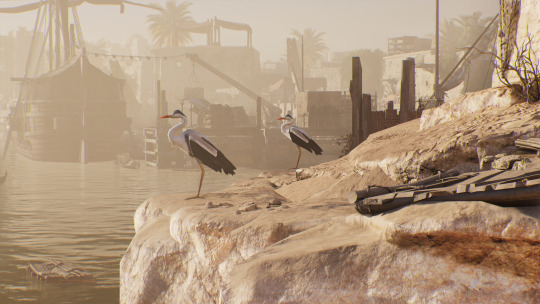
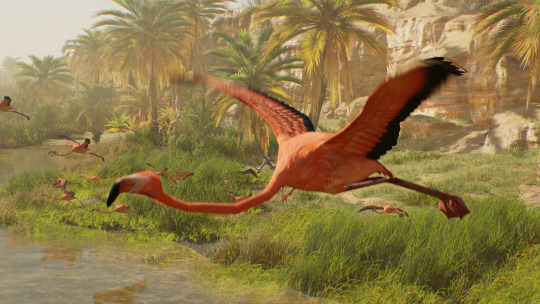

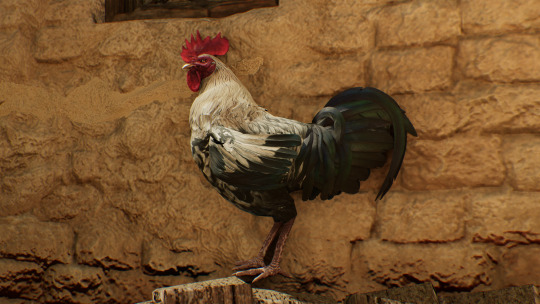
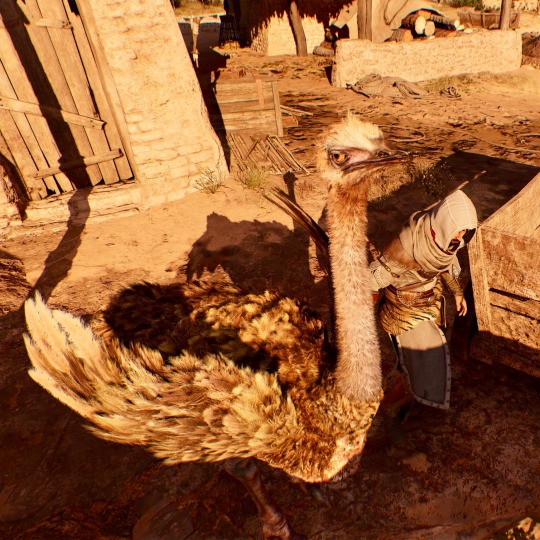
5/5
excellent little guys! bird/5. extra half point for the eagle (?) bc i love raptors and am very biased
chicken consultant on the rooster:
"3/5 love this animal very holdable. points docked for Generic Chicken Breed wheres my FLAVOUR. also its a leghorn i think?? im not the smartest"
25 notes
·
View notes
Text
Soooo I finished AC Mirage and I gotta say….
I loved it. It was fun, it wasn’t overwhelming, it wasn’t extremely RPG (love RPGs don’t get me wrong but the best part of these games is the laid out story at least when they were really good) and it had just the right amount of elements of old and new to make it interesting.
SPOILERS AHEAD!!!!
I loved the reveal of Nehal. I was wondering why no one ever really spoke to her or brought her up, especially after all of those people died in Anbar in the beginning. In my opinion, and that’s just what I’ve gleaned, that she is Loki, but I haven’t played Valhalla yet so I’m not sure that’s the case, but I will be looking forward to giving that game a go!
#assassins creed#asscreed#assassins creed mirage#basim ibn ishaq#ac basim#assassin’s creed#game review#honestly I love Basim so much I’m waiting for my fanfiction as we speak
9 notes
·
View notes
Text
i got the newest assassins creed for xmas
younger basim: 🚫
older basim with full beard: ✅
11 notes
·
View notes
Text
Caved and got AC Mirage. Honestly? Genuinely haven’t enjoyed a new AC title this much in a long time. I can see elements from all the AC games I’ve played (which is AC1 through to Unity, then Origins). So far the story is decent and Basim is a compelling protagonist without being an Ezio clone. I like the eagle in this one too, which I didn’t like in Origins. But I’m mainly just happy that it actually feels like an AC game again. I hope it continues to hold up!
#asscreed#ac mirage#assassin’s creed mirage#basim ibn ishaq#mini review#I guess lol#also loving the lack of boss fights#never got why they were added it was weird
11 notes
·
View notes
Text
Here's The Trailer Of ‘ASSASSIN’S CREED: SHADOWS’ | Release Date is November 15, 2024.
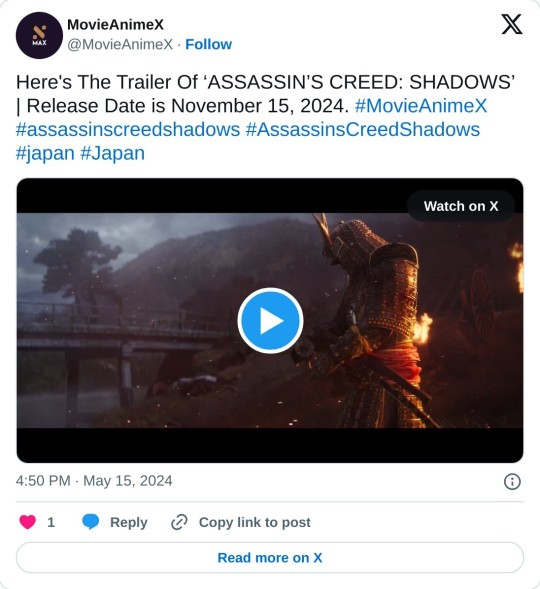
#assassins creed#assassins creed shadows#Assassins Creed: Shadows#Assassins Creed Shadows#assassin's creed#assassin's creed shadows#newrelease#newgame#trailer#ubisoft#MovieAnimeX#movieanimex#review#japan#Japan
5 notes
·
View notes
Text
Well I finshed basim story and I think ubisoft did absolutely great bring back the old ways and his story was so good to see and the ending well spoilers don't want to say but it gave me shock and cry a bit overall I give the story a 10/10 as basim is such a great chachter to follow and I belive this is the final assassins creed main series aka for the Xbox style gaming as I know there doing the VR game and also the China one but that rpg on a mobile game and the other one AC ex I think it was called am sure is on a diffrent platform too if am wrong let me know so anyways basim and nehal are such a great pair when there togther I loved this one quteo he says (won.t say anything about what part he said it as again spoliers) "I want home I want nehal " when he said these word it made me cry a little because it so sweet because even if he got on alright with Roshan and I know people ship them but nehal was always the woman basim always turn to and being his friend for years it feel.like there relenship was like close soulmates that had a thing with eatchother overall I ship them even if the ending was sad 😔 these two were so sweet and it is nice that ubisoft never made a love insterst fully for this game and for basim but if he did have one in a way it would of been nehal since she gose were he gose always with him face to face or even in his heart ❤️
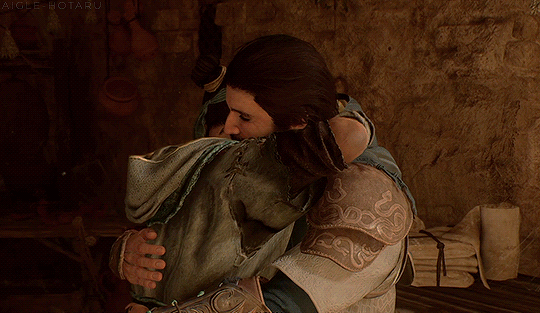
#assassins creed mirage#basim ibn ishaq#ac mirage#ubisoft#my review#basim x nehal#soulmates#close friends#i ship them so much there my babies#nehal#ac spoliers
6 notes
·
View notes
Text
youtube
A short review from an early access version of Assassin's Creed Mirage with focus on gameplay and an overall impression of what is essentially a closed demo. (He didn't say when he played the game so it's possible he played an earlier version of it before it went gold).
(warning: he mispronounces Basim's name... a lot.)
#it should be noted that this is sponsored#but i like him as a reviewer so i'm willing to trust him#honey you got me at 'stealth heavy'#assassin's creed#assassin's creed mirage#Youtube
9 notes
·
View notes
Text
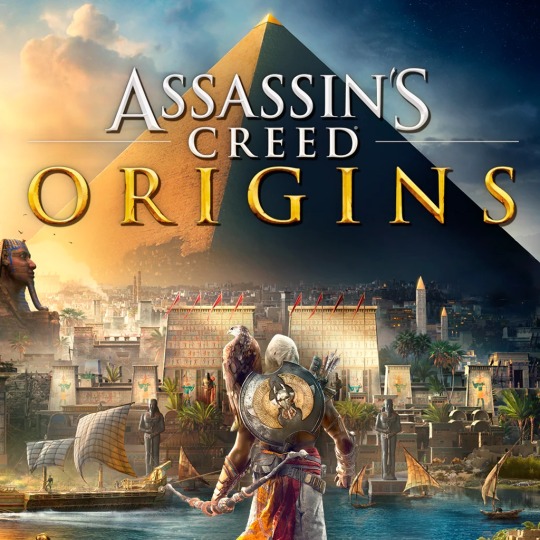
I want to take a moment to discuss one of my all-time favorite games - Assassin’s Creed Origins. I have to admit, I'm a little baffled by all the criticism this game has received. In my opinion, Origins breathes new life into the franchise with its immersive open world, compelling story, and memorable protagonist, Bayek.
Let's start with the setting: Ancient Egypt. Ubisoft did a phenomenal job recreating the vibrant landscapes of this historical period. Exploring the bustling cities of Alexandria and Memphis, traversing the vast deserts, and delving into hidden tombs felt like an adventure of a lifetime. The attention to detail is truly remarkable, making Origins a visual masterpiece.
The storyline, revolving around the origins of the Assassins Brotherhood, is captivating from start to finish. Bayek, our protagonist, is a complex character driven by revenge and justice. His emotional journey kept me engaged throughout the game. I genuinely cared about his struggles and triumphs, which is a testament to the exceptional writing and voice acting.
The gameplay mechanics in Origins are a welcome departure from the previous titles. The combat system feels weighty and strategic, requiring you to think tactically in battles. The addition of RPG elements allows for character progression and customization, making each playthrough unique. The wealth of side quests and activities also provides hours of additional content, ensuring you won't run out of things to do.
One aspect that deserves special mention is the breathtaking attention to historical accuracy. Assassin’s Creed Origins presents a wealth of information about Ancient Egypt, its culture, and its rich mythology. From the architecture to the costume design, it's evident that the developers put immense care into crafting an authentic experience.
Now, let's address the controversy surrounding the game. I understand that some fans were disappointed with the shift from the traditional Assassin's Creed formula. However, variety is what keeps the franchise fresh and exciting. Origins took a risk, and in my opinion, it paid off. It laid a solid foundation for future installments to explore different time periods and characters while still maintaining the core essence of the series.
Finally, I wholeheartedly agree with those who hope for more of Bayek's story. He's a memorable character with untapped potential. His journey in Origins only scratched the surface of what he's capable of, and I'm eagerly awaiting the day when Ubisoft decides to continue his narrative.
In conclusion, Assassin’s Creed Origins is a remarkable entry in the franchise that deserves more love and appreciation. Its breathtaking world, engaging story, and deep gameplay mechanics make it a standout title. If you haven't given it a chance yet, I strongly encourage you to dive into this mesmerizing journey through Ancient Egypt. You won't regret it!
#assassins creed#assassins creed origins#bayek of siwa#assassin's creed#Egypt#ancient egypt#history#video games#review
7 notes
·
View notes
Note
How was Creed 3?
Ahhhhh-maaaa-ziiing!! 👏🏾😁
Michael B Jordan did an amazing job. I was so proud of him with his directing skills!! Especially for his FIRST TIME! Like, WOW! 😳 It was so well done!
I saw it on IMAX and it was def worth it to me, and it was such a FUN movie. I was smiling the entire time lol 😆 😂
You could tell the audience really enjoyed it as well. 😊
I should have re-watched parts 1 and 2 before seeing 3, but oh well lol 🤷🏾♀️ I can always go back and watch them later.
But yea girl, HIGHLY recommend! If this movie doesn't make a killing at the box office, then idk what ppl are smoking lol 😂
It was a fun movie, the pacing was PERFECT, the acting was great.... And I really felt like Mike and Jonathan hated each other in the film lol, so it's so funny to see them be buddy buddies during press interviews! Rofl 🤣 That's how good their acting was!!
And the eye candy!! Lawwwddd the eye candy!! 😭😩🥵🥵

🤣
So yea.... in these covid times I def got my money's worth with this movie chiiiile.... Highly recommend lol 😆
23 notes
·
View notes
Text
Others: “AsSaSsIn’S CrEeD SyNdIcAtE hAs BaD cOmBaT, iS tOo CoMiCaL, aNd HaS aNnOyInG pRoTaGoNiStS!”
Me, starting my 4th playthrough of Syndicate: Oh, I’m sorry. I can’t hear you over the sound of how much fun I’m having this this game!
#yes Crowie made the mistake of watching youtube reviews and rankings for AC stuff again#will I ever learn?#probably not lol#I'm so stuck in my little corner of Syndicate and Unity love that always forget how looked down upon Syndicate is by the rest of the fans#(or at least the ones who frequent youtube)#no matter; I still adore this game - flaws and all#Assassin's Creed Syndicate
16 notes
·
View notes
Text
Okay so I listened to The Creed of the Kromon. Um. That was definitely an audio that existed. There were some good things, but they're outweighed by a general sense that the story doesn't know what it's doing, and a lot of mischaracterization, mainly on Charley's part. If you want to see C'rizz then listen to Part 1 and maybe Part 2, everything after is not handled well.
Good things first: I do like the situational irony that this supposedly chaotic universe actually just runs on its own rules. It makes sense that the Time Lords would think of anything different from their own world as wrong, and it also aligns with what we learn in Scherzo, that there are intelligent entities out there running experiments that are also cruel enough to run them like that. The scene where the Doctor's laughing at his interrogators is fairly fun, although it's like 1.5 minutes that really don't justify listening to the rest. Some parts of the soundtrack were pretty nice? And I'm not super attached to C'rizz yet, but he seems interesting and I do want to see where he goes next. The Kro'ka seems like a fun antagonist as well.
Unfortunately, the rest of it is just... not good. I think the main problem is how Charley was written. They did her so bad. She's portrayed as either helpless or reckless, with little say in her actual fate, and she's constantly crying out for help from the Doctor or C'rizz in a way that really doesn't align with her previous behaviour. Is this "the bravest person in the room" Charley? "Take my hand anyway" Charley, who is just as strong as the Doctor, albeit in different ways? Edwardian Adventuress Charlotte Pollard? Sure, she needs help, she gets scared and desperate, but not at every single moment something vaguely challenging happens. That's not consistent with her behaviour. Scherzo literally just happened. And she doesn't even remember what happens to her at the end. It's like the writers realized that they didn't have much of a story to tell and nothing they did here had any impact on character development, so they decided to erase the story from the overarching plot as much as they could. (Also, despite what should be fairly high personal stakes at any given point, the plot still somehow manages to feel boring.)
I feel like the general disgustingness and clumsiness of everything in Parts 3 and 4 is fairly self-evident, so not much comment there. I was listening to this audio while doing something else, so at least I wasn't focusing on those parts as much.
Despite being a story about a Zone running on bureaucracy, there are a lot of little gaps in internal consistency - Charley introduces herself as Charlotte but the Kromon alternate between calling her Charlotte and Charley; the Kromon all have some kind of shared spirit influencing them but they're also all controlled by the queens, which themselves are controlled by that spirit which can't even do anything to stop their destruction; most notably, the Kromon don't know what time is, but C'rizz frequently asks about the length of duration, even referring to "minutes" and "hours." I know that when the Time Lords referred to "a universe without time" they meant that there was no structure that could manipulate and shape time, so subjectively time would still pass, but only in a linear and consistent way. But the Kromon clearly still have a sense of before and after that aligns with the passage of time, so why don't they have anything to describe it?
It just doesn't feel like there was a purpose to this story. Ironically, it felt scattered; the plot made sense, but only if you just accept everything and don't think about the weird characterization. I think this is the first audio that I kind of regret listening to.
#if you do want the Doctor dealing with antagonistic bureaucracy then Human Resources (New 8th Adventures season 1) is really good#doctor who#big finish#eighth doctor#charley pollard#c'rizz#the creed of the kromon#idk if anyone will read this but I kinda just wanted to review it#because it could've been good? but it just wasn't. it was bad and confusing.
3 notes
·
View notes